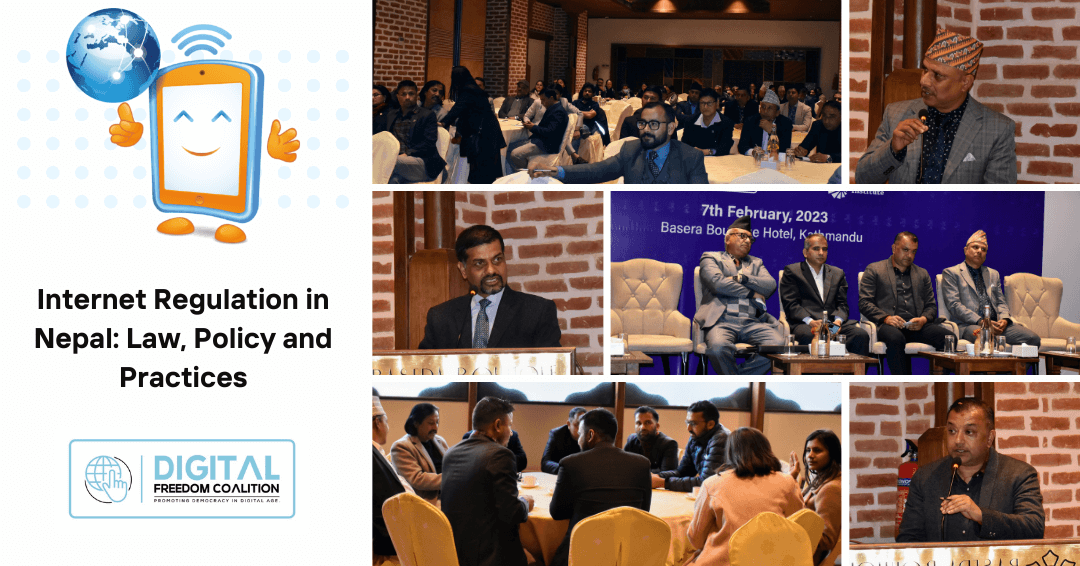Safer Internet Day has been celebrated in around 180 countries and territories worldwide on 7th February since 2005. This year youth IGF Nepal along with the coalition members of Digital Freedom Coalition organized a High-level Panel on Internet Regulation in Nepal on the occasion of Safer Internet Day 2023 on 7th February 2023.
Program Outline:
- Arrival and Registration: 13:30-14:00
- Inaugural Session: 14:00-14:45
- Internet Regulation in Nepal: A Political Perspective: 15:00-16:30
- Closing Remarks: 16:30
- Dinner: 17:30 Onwards
The inaugural session was started with a presentation on Position Paper about The Internet Regulation Policy and Practices in Nepal by Mr. Ananda Raj Khanal. Mr. Khanal’s presentation covered cybersecurity and ICT policies in Nepal, where he highlighted the global economy of cybercrime which has reached 6 trillion dollars annually. He further emphasized the need for improved mechanisms to trace and prevent cyber attacks in the context of Nepal, citing the recent attack on NITC, which caused the airport to go down for almost 5 hours. He noted that while there are many existing policies and legislations related to ICTs in Nepal, what is lacking is harmony and proper jurisdiction, emphasizing that the Ministry of Communication and Information Technology should focus on infrastructure and access, while other related services could be handled by other ministries or agencies with related expertise.
During his presentation, Mr. Khanal discussed the Digital Nepal framework, highlighting the lack of progress on its indicators, as well as other government digital initiatives that have had unsatisfactory achievements. However, he praised the Nepal Rastra Bank for its successful adoption of new technologies in the fintech sector. Mr. Khanal called for a more holistic approach to internet governance in Nepal, emphasizing the importance of inclusive legislation that is consulted with all stakeholders. He concluded that Nepal’s existing policies, legislation, and institutional and regulatory framework are inadequate to address the challenges of the digital age, and precise reformation is needed to keep up with the demands of today’s digital world.
After Mr. Khanal’s position paper presentation, the guests of the Inaugural session provided their remarks. The guests were Chairman of Nepal Telecommunication Authority, Mr. Purusottam Khanal, Vice-Chair of Nepal Law Commission, Prof. Dr. Laxmi Pd. Mainali, and the chief guest of the session, Hon. Gagan Kumar Thapa.
Mr. Khanal began his remarks by pointing out the lack of clear demarcation between the two ministries responsible for technology in Nepal, resulting in confusion over which ministry governs which technology. He raised concerns about the absence of a regulatory framework for content regulation on the internet, which has led to conflicts regarding jurisdiction over national sovereignty, defamation, and other issues. Mr. Khanal highlighted the lack of capacity and resources within major institutions responsible for Information Technology grievances, and criticized the breach of fiber cables by government institutions without providing right of way and alternatives.
Mr. Khanal expressed concerns about the lack of clear demarcation between technology-related ministries in Nepal, as well as the absence of a regulatory framework for internet content. He also highlighted the insufficient capacity and resources within major institutions responsible for Information Technology grievances. Additionally, Mr. Khanal criticized the lack of a sole authority for ICT and emerging technologies to establish standard frameworks for solving common issues, and the breach of fiber cables by government institutions without providing right of way and alternatives. Despite NTA’s efforts to initiate policies and draft a cyber policy with ITU’s support, the government and line ministries have failed to respond adequately. Mr. Khanal stressed the need for updated policies and regulations, and urged the government to work with regulatory bodies to bridge gaps in understanding and practices to meet the technological needs of the digital age.
Prof. Mainali expressed his gratitude for being present among dignitaries and expressed his high expectations from the Hon. Members of the Federal Parliament who were in attendance. He called upon them to increase the role of the Nepal Law Commission in the formation and amendment of legislation, as well as in research and innovation in the legal arena. Prof. Mainali said that the Law Commission is prepared to assist in the development of umbrella legislation to regulate the ICT sector in Nepal.
Hon. Thapa emphasized the importance of promoting ICT as an industry and entrepreneurship, but acknowledged that hurdles must be cleared to achieve this goal. He mentioned legal provisions related to foreign investment, which limits FDI above 50 million but he is advocating for reconsideration for the ICT industry and startups. Hon. Thapa identified issues with internet adaptation, awareness, and policies and called for a holistic approach to viewing the internet as a medium of change. He also urged the panel and audience to identify gaps in existing legislation, policies, and regulatory frameworks that can be fixed by parliamentarians and expressed a willingness to take these issues forward and work towards endorsing them.



